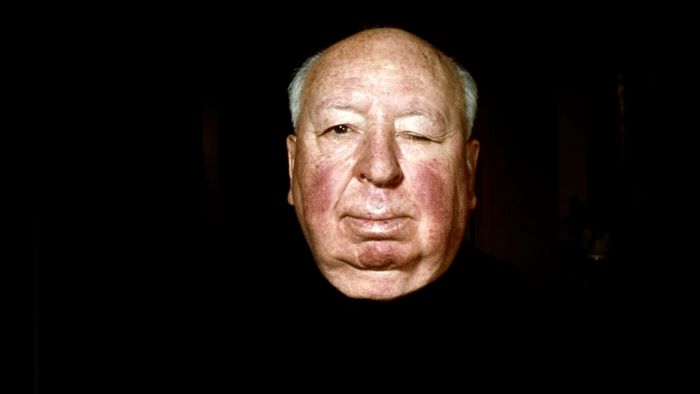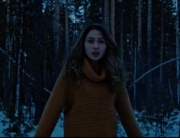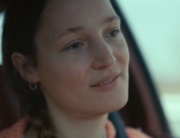Outside of Steven Spielberg, there’s arguably no more recognizable filmmaker than Alfred Hitchcock. Even for those who have never seen his movies, they may know him from his long-running television series, Alfred Hitchcock Presents. He was also instantly recognizable from cameo appearances in his own films, as well as his distinctive voice and dry humor heard in interviews.
Northern Irish director Mark Cousins uses those traits for the latest of his typically idiosyncratic documentaries. The first voice we hear is that of Hitchcock, but when he tartly mentions the “sophistication” of 5G phones, we realize it isn’t the real Hitchcock. Instead, it’s British actor Alistair McGowan’s uncanny impression. Although Cousins did something similar in The Eyes of Orson Welles—where Welles was voiced by Jack Klaff—there are problems with this approach: like most impersonations, it sounds a lot like Hitchcock but also enough not like him to sound just a bit off each time you hear it. (Enough interviews exist to use Hitchcock’s real voice.) Although much of the narration comes directly from Hitchcock’s writings and interviews, Cousins has taken liberties (like the aforementioned 5G reference) and written stilted asides and one-liners that add little.
However, if you can get past McGowan’s fake interview with the faux Hitchcock for two hours, Cousins provides a master class in focusing on thematic strands in Hitchcock’s imposing body of work (more than 50 feature films, from the 1920s silent era to 1976’s Family Plot). Cousins divides the film into six chapters: “Escape,” “Desire,” “Loneliness,” “Time,” “Fulfillment,” and “Height.” If these choices seem arbitrary, they are an excuse to dazzle viewers once again with some of the most celebrated sequences in film history.
Cousins’s own dazzling editing mimics Hitchcock’s as he playfully intercuts famous moments from classics like Strangers on a Train, Rear Window, Psycho, and The Birds, alongside lesser-known sequences from silent movies like Blackmail. By lining up similar visuals from different films—like the succession of outdoor establishing shots that begins the “Escape” section—Cousins astutely underscores Hitchcock’s thematic organization. “Look closely at my pictures and you see things,” McGowan/Hitchcock says. It sounds like a mere truism, but it’s a statement that cuts to the core of Hitchcock’s cinematic ingenuity. Cousins is at his best exploring how Hitchcock plays with time in that eponymously named section.
Even if a self-conscious aura hangs over the documentary, no matter—Cousins self-indulgently includes newly filmed footage of a young man busily staring at his phone as strangers walk around him and the voice-over preachily mentions “information overload.” Nevertheless, the combination of Cousins and Hitchcock is transfixing and endlessly watchable.







Leave A Comment